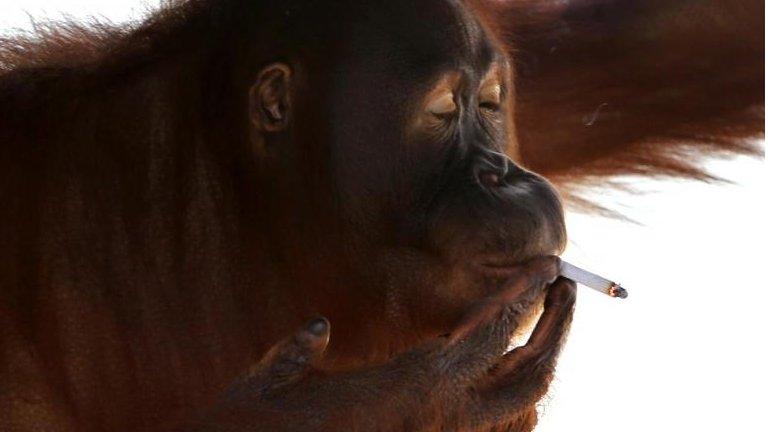Indonesian zoo accused of 'starving' sun bears by activists
- Published
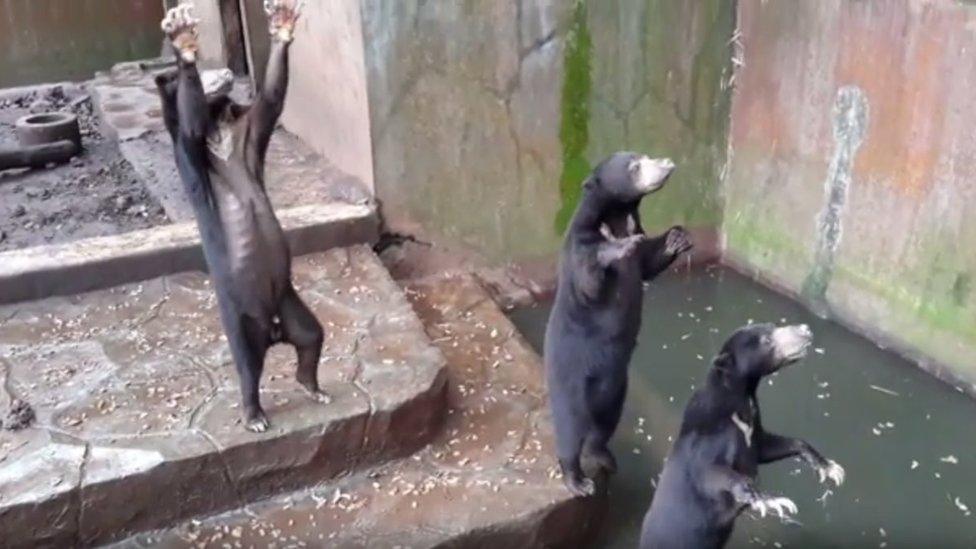
The bears look skeletal and can be seen begging for food from visitors in a video taken in July 2016
Indonesian activists are lobbying for a zoo accused of starving its animals, including sun bears, to be shut down.
Recent videos taken at the Bandung Zoo by the activists show the bears looking skeletal and begging for food.
It is the latest accusation against the controversial attraction - it was previously criticised for mistreating an elephant which later died.
But a zoo official has denied the claims, saying that the bears are sufficiently fed and are healthy.
Indonesia's zoos are notorious for their inadequate conditions, with most scoring poorly against government-set standards.
Read more: Indonesia's 'zoo of death' in Surabaya
The push to close down the Bandung Zoo is led by Scorpion Wildlife Trade Monitoring Group, which has been monitoring the sun bears since last year.
It has staged protests calling for the zoo's closure, and is also running an online petition.
Their videos, taken since mid-2016, show the bears pacing around in a concrete enclosure and standing up on their legs apparently begging visitors for food, who throw them junk food.
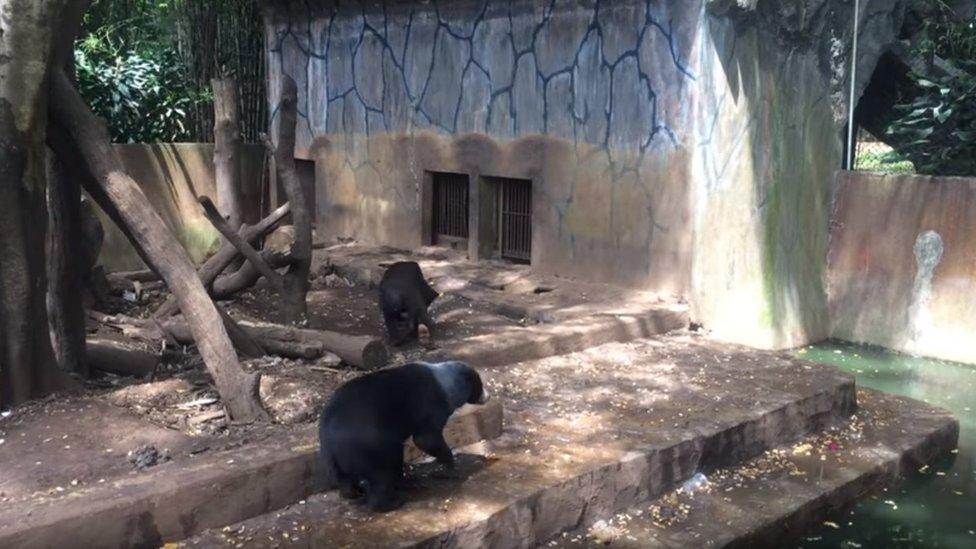
The bears are housed in a concrete enclosure
One clip also shows a bear defecating and immediately eating its own faeces.
"The enclosure is dirty, the water is polluted and unclean, and the floor has no grass. There are no live trees in the enclosure," Scorpion's programme director Gunung Gea told the BBC.
He said that activists had been periodically visiting the bears to feed them fruit, which is part of their natural diet.
'Soul-destroying'
"The fact that you can see their ribs, that is certainly not normal. They are underfed," said Gabriella Fredriksson from the International Union for Conservation of Nature.
Ms Fredriksson, who is co-chair of the sun bear expert committee, told the BBC that a sun bear eating faeces may be exhibiting "extreme boredom".
"Sun bears are very active animals. If they are stuck in a concrete pit with nothing to do, no stimulation for climbing and digging, it's soul destroying to say the least," she said.
The concrete floors would also damage their soft feet, while the lack of shade may cause cataracts in sun bears which are used to living in dimmer environments.
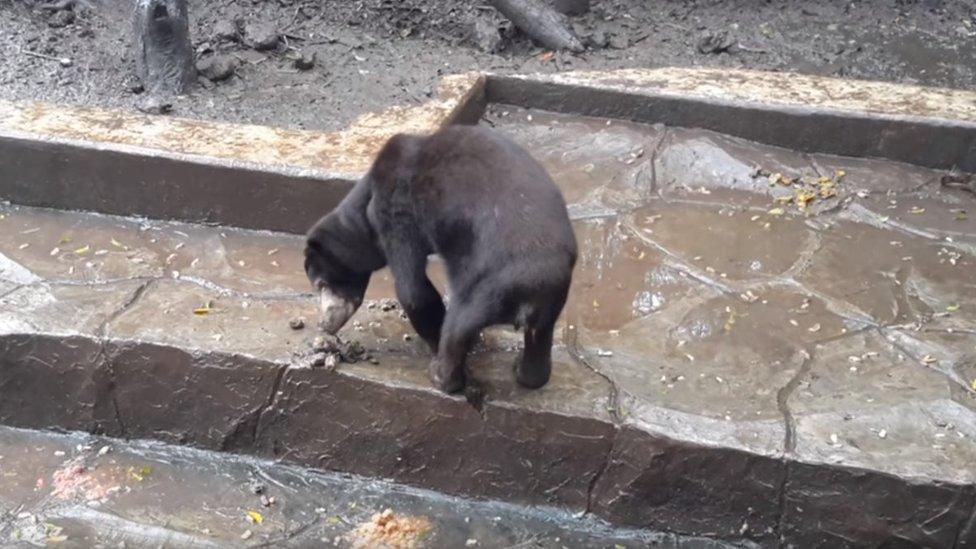
One bear is seen eating its own faeces immediately after defecation, a possible sign of extreme boredom, says one expert
Mr Gea said that the other animals in the zoo also appeared to be in poor condition. Other videos taken by the group show deer with skin conditions, and chained-up elephants.
Reviews on travel rating website Tripadvisor, external of the zoo have been universally critical, with many saying the animals appeared neglected and in distress.
"A horrible place, hell on Earth for all these poor animals. Rusty cages, dirty place and really neglected animals," wrote one reviewer.
'Old case'
But Bandung Zoo spokesman Sudaryo dismissed the issue as an "old case". He told BBC Indonesian that they feed the bears regularly and also conduct regular health checks.
"We provide enough food... People say they are thin, but does (that) mean they are not healthy and they are not eating? It's not," he said.
He added that the bears were begging "because there are people who throw food at them", and that the zoo has told visitors to stop this practice.
The zoo last made the news in May 2016 after activists highlighted the plight of Yani, an elephant that died from an unknown disease. The zoo was said to have failed to give adequate medical care.
Bandung's mayor, Ridwan Kamil, told reporters last year that he had no power to shut down the zoo as it was privately run.
A Jakarta Globe report, external in 2015 said that out of the 58 registered zoos in Indonesia, only four were found to be "decent and appropriate".
The controversy over Bandung Zoo follows that of the zoo in Surabaya, dubbed by some the "zoo of death" after several animal deaths in recent years.
- Published7 February 2014
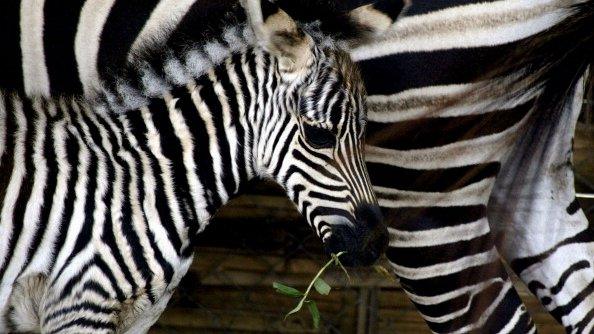
- Published27 July 2012
